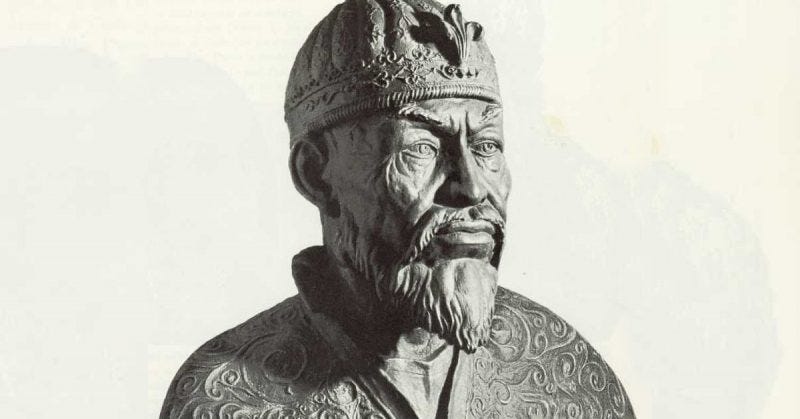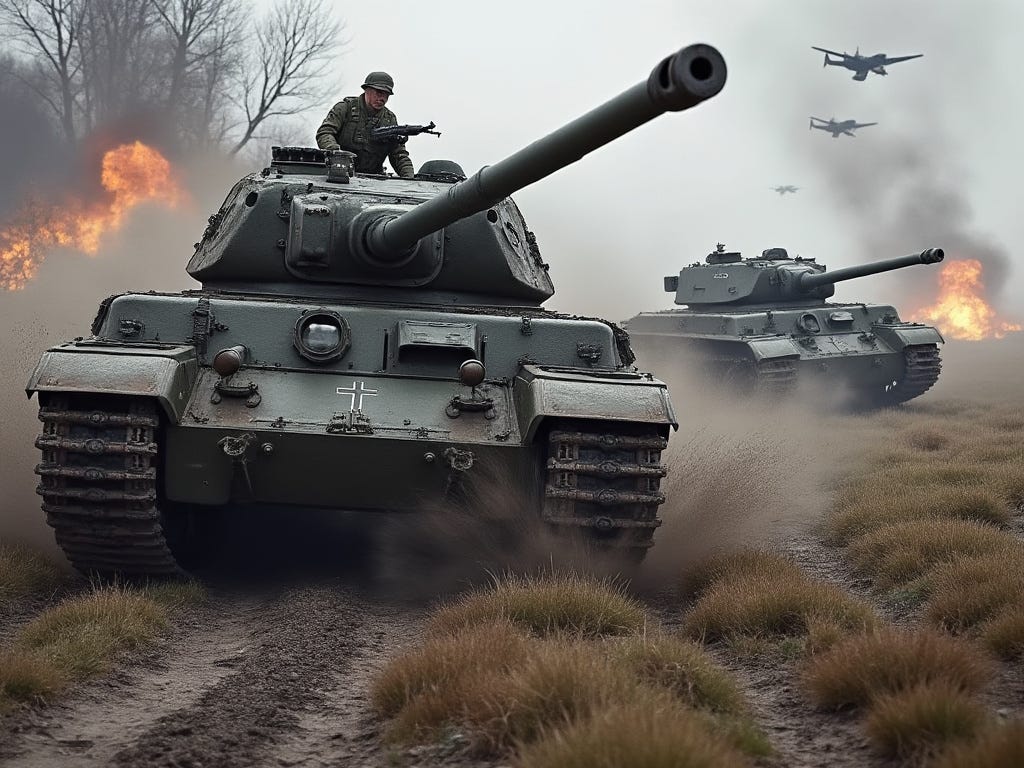Could the Axis Have Won WW2
With a bit of patience and better strategy, we all might have said "auf wiedersehen" to our freedom!
Today’s alternative history tackles a question no one, ever, anywhere, has ever considered before: Could Germany and the Axis powers have won in WWII? Mind blowing, I know, but I have the answers.
First…the throat clearing. I think the “alternate ending” dialogue over WWII focuses mainly on Germany’s remarkable technical achievements by the end of the war…on everything from tanks to assault rifles to rockets. In reality, this all came too little too late, but what if it hadn’t? At the same time, we must recognize we’re all better off for the Nazi (and Tojo and Mussolini) regime losing. These were murderous, genocidal, fascist governments, so alternate history is an exercise in tactical debates, not a wish for a different outcome.
The thing that’s fascinating about WWII is it followed a very different course from WWI, which I’ve already written about. WWI was, arguably, winnable by the Central Powers up until near the end. By contrast, WWII was topsy-turvey. It opened with smashing, shocking successes by the Axis powers (particularly Germany and Japan, not so much Italy). But by 1943, at least with 20/20 hindsight, the Axis was clearly doomed, and the outcome really wasn’t in question. Yet this paralleled a remarkable advance in technology, particularly on the German side (yes, yes, the Americans were also doing wonders). This presents us with some interesting “what ifs”.
It has to be recognized upfront that the Axis powers had significant disadvantages going into the war. Much of this was in terms of strategic resources such as oil and rubber. But also in terms of relative manpower and manufacturing strength. Further, the Axis powers started the war with a lot of rubbish in terms of war materiel. Japan had an excellent Navy, and the fantastic Zero fighter, but it’s tanks and infantry weapons were pretty bad. Germany also had excellent fighters (the Bf-109 mainly at the start of the war), and tactical bombers, but lacked strategic bombers, much of a navy beyond U-boats, and its tanks were actually pretty underpowered at the beginning of the war. Strangely, most armies depended largely on WWI era bolt-action rifles, aside from the US (the only army to issue a semiautomatic rifle as standard issue), despite that prototypes of semiautomatic and automatic rifles were available (the Germans and Russians would use them in modest quantities). Further, the main Axis powers…Germany and Japan, were strategically and geographically distant from each other and coordinated their actions poorly. But though odds were always a bit long, they still could have won. Here’s how:

Don’t Do Genocide.
Once we get past the obvious modern moral standards that genocide (the mass killing of an ethnic group) and ethnic cleansing (the forced removal of an ethnic group from a geographic are which doesn’t necessarily involve mass killing) are repugnant, we get to the stickier question of whether these practices work. My sense is the answer is yes, so long as you’re not restrained by any ethical considerations. Many civilizations in history employed these tactics and they often worked well enough (think of the Roman diaspora of the Judeans for instance…the ramifications of which we still live with today, but it worked just fine at the time).

However, in the case of Germany, the Holocaust involved the mass killing of its own citizens and those in occupied territories. Aside from the obvious PR nightmare, this absorbed resources, strained military personnel (many of whom, it turns out, did not like murdering unarmed people), and distracted leadership from the war. Further of the millions killed, many of the adult men could have served as soldiers and many others could have worked in factories more productively than was possible in labor camps.
The Japanese turned their genocidal impulses toward other Asians in the main and, as such, didn’t tear apart their own society to the same degree as the Germans. But the Japanese were vastly outnumbered by their captive populations and brutal treatment can increase resentment and resistance. In neither case did genocide and ethnic cleansing advance their causes and, in some cases such as with the Ukrainians, deprived the Axis of being seen as liberators (from the murderous Soviets in that case).
We’re basically saying that the Axis would have been better off with authoritarian, pro-war parties who weren’t also racists (and the leadership of both Germany and Japan was highly racist). So, Germany avoids the Nazis, while still advancing right-wing authoritarianism, and Japan still becomes a military state but without the sense of ethnic superiority compared to other Asians.
The East European, West Asian Alliance Strategy.
For Japan, WWII effectively kicked off with its invasion of China in 1937 and Germany with its invasion of Poland in 1939. But what if neither of these events happened? Instead…what if the Axis worked to make allies (or at least sympathetic neutrals) of Poland and China?
Chiang Kai-shek’s Nationalist regime was pretty authoritarian. To be sure, China and Japan had deep resentments against each other. Japan was also hungry for resources and territorial gain. But Germany and China were fairly amiable in the lead up to war. Germany could have convinced Japan to be patient and ignore the looming quagmire for little profit in China, for more profitable targets in Southeast Asia and the Pacific. Not going to war would also have kept tensions between Japan and the US to a light simmer, keeping US oil exports flowing (although more on Japan’s oil problems below). Germany could have arranged some agreements between Japan and China, likely involving Japanese aid to Chiang in fighting Mao Zedong’s Communist revolutionaries in exchange for China accepting Japan’s puppet state of Manchukuo.
In Europe, the Polish state had been recreated by the Entente Powers out of portions of Russia, Austria, and Germany which had gobbled Poland up in previous centuries. In doing so, they gave the German city of Danzig to Poland as a port, thereby cutting East Prussia off from the rest of Germany.
My advice here for Germany would be…give up on Danzig. Instead, court the Polish state and nudge its government in a pro-German direction. Germany had been proficient in doing this throughout the rest of Eastern Europe and had already gotten Poland to participate in the dismemberment of Czechoslovakia, so I don’t think this possibility is entirely unlikely. Poland was protected by the UK and France via a defensive alliance system. But this didn’t prevent it from forming a defensive alliance with Germany, at least not until the alliances were strengthened as war loomed in 1939.
With Russia eyeing Polish territory, Germany might have nudged Poland away from the UK/French alliances, instead joining Poland to a pan-European eastern alliance obviously meant as a deterrence to Russia (the Baltic States and Finland might also have been added, although they might have triggered war with Russia early which was undesirable as we’ll discuss below). With this approach, Poland could have added its decent army to the Axis and served as a buffer state of sorts against the Soviet Union, while also gaining Germany’s more immediate protection as compared to the more distant help of France and the UK.
Delay the War.
This bit is pretty simple. If the Axis could have delayed the war for a few years, technologically they would have been in a much better place than 1939. Particularly if Germany avoided some of the delays in developing its best technology, it could have entered the war nearly unstoppable. Imagine a German army in 1944, routinely armed with fully automatic StG-44 rifles, Panther and Tiger tanks, jet fighters, cruise missiles, ballistic rockets, Grief strategic bombers, etc. Maybe even something of a non-embarrassing navy.

The wildcard here is the Soviet Union, the obvious first target of the Axis if they had their wits about them. The Soviet Union already had plans to attack Germany. Add the threat of the German-Polish alliance, and Japan likely to renege on their non-aggression pact with Russia and it’s hard to know how long Stalin would have gone without attacking. But every year would have advantaged the Axis.
Russia First
Lack of strategic cooperation haunted the Axis. Though both main Axis powers attacked the European allies, after that they went their separate ways, Germany attacking the Soviet Union without Japan, and Japan launching a war against the United States (which Germany quickly joined).
Obviously, the Axis should have kept the United States out of the war as long as possible. But they shouldn’t have attacked Europe first either. A combined and coordinated German/Japanese assault on the Soviet Union would have been devastating. Even if the Japanese didn’t make much progress in the East, they would have tied down significant forces in the East that otherwise were transferred to the West to stop German offensives.
The incentive for Japan was, in absorbing significant parts of a defeated Soviet Union which had significant oil fields, Germany could have provided cheap oil exports to Japan. This would have solved much of Japan’s oil problems, making them less reliant on US exports.
With Russia defeated, now the Axis could turn their attention to the European alliance. Without question, Japan still takes over southeast Asia, and Germany defeats France. Even in the actual war, the British struggled with technological innovations (aside from their excellent air force), and so the Germany army is clearly superior with a later start, particularly in terms of tanks, and the possibility of being able to use newly developed strategic bombers and long-range fighter escorts to launch a more successful Battle of Britain.
With no Operation Barbarossa to distract them, the Germans and Italians beat the British in North Africa. Could the Germans get across the Channel to invade the UK? That’s always the dodgiest question, as even in an optimistic scenario the German navy would be nowhere near the British. But a better Luftwaffe might have equalized this over the channel at least, making an invasion possible.
Again, the objective is to keep the Americans out of it. In fact, why go to war with America at all? At this point, the Axis would have solved their resource problems. Undoubtedly the Americans would have wizened up to the threat across the oceans, but by this juncture there would be little to do other than perhaps support an isolated UK and hope (probably correctly) that the oceans would protect them indefinitely.
Conclusion
The Axis would always have been at the disadvantage in any protracted, multiple-enemy war. But a series of swift wars with a “divide and conquer” strategy might have paid off. What do you think? Could the Axis have won in WW2? Would love to hear your thoughts!





